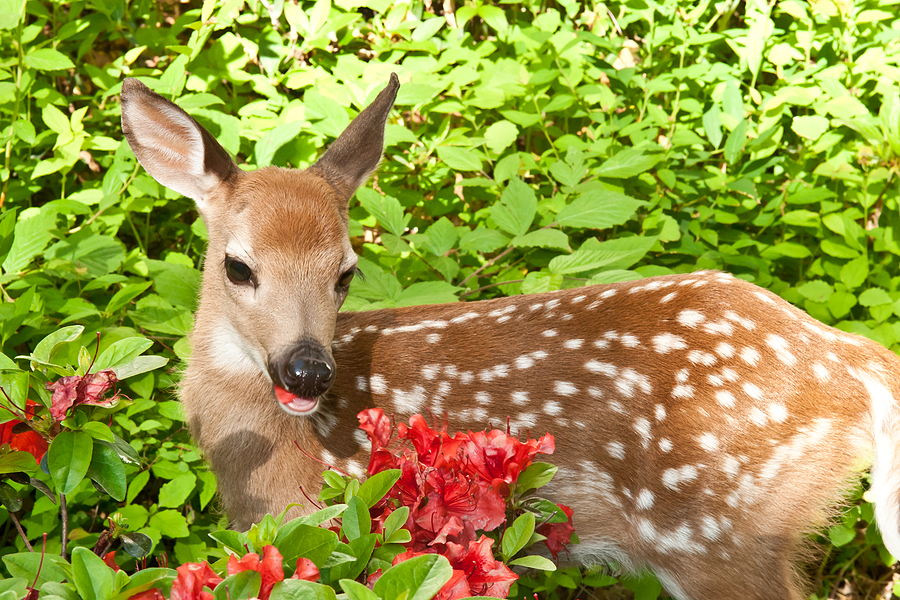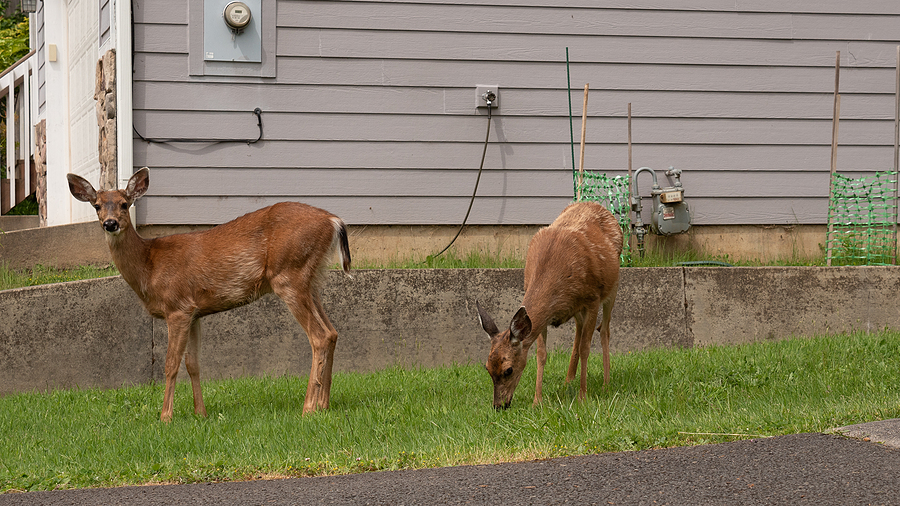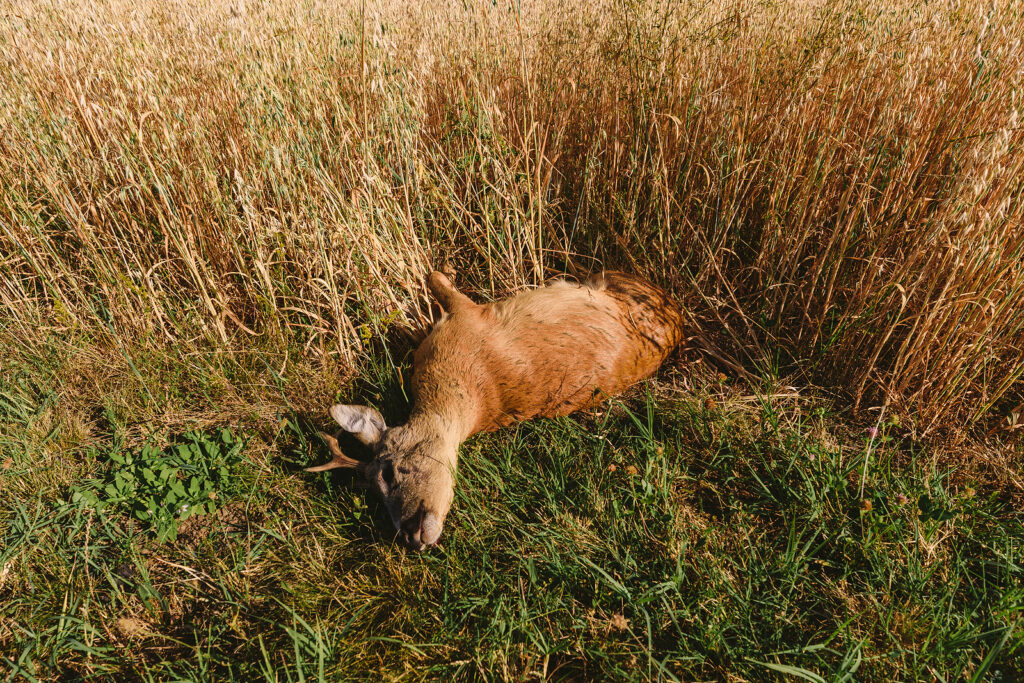Is your garden being nibbled away by uninvited guests? If you are a gardener or homeowner, you know how frustrating it can be to see your hard work destroyed by deer. But worry not! This blog post will guide you through the fascinating world of natural deer repellents and sustainable solutions for effective deer management.

What You Need to Understand About Nuisance Deer
Deer are beautiful creatures, but they can become a nuisance when they decide that your garden is their favorite buffet. Protecting your plants from these graceful yet hungry visitors is a challenge many gardeners and homeowners face. This blog aims to help you understand deer behavior, explore various natural deer repellents, and provide practical tips to keep your garden safe—all while being humane and sustainable.
Typical Deer Behavior
To effectively keep deer at bay, it’s essential to first understand their behavior and preferences. Deer are creatures of habit and tend to follow the same paths when foraging. They are especially attracted to gardens in urban and suburban areas where food sources are plentiful and natural predators are scarce.
Why Deer Love Urban Gardens
Urban and suburban gardens offer a smorgasbord of tasty treats for deer. From tender young shoots to juicy fruits, your garden is likely a veritable feast for these animals. Additionally, the lack of natural predators in these areas makes gardens an ideal foraging ground.
Signs of Deer Damage
Knowing how to identify deer damage is the first step in protecting your garden. Look for signs such as bark rubbing on trees, trampled plants, and jagged edges on leaves and stems. Deer often leave these telltale signs behind, allowing you to take timely action.
Application Timing Matters
Deer are most active during dawn and dusk. Understanding this pattern can help you plan your repellent application schedule for maximum effectiveness. Seasonal changes also influence deer behavior, with heightened activity in spring and fall.
Pros and Cons of Common Deer Repellent Methods
There are various methods available for deterring deer, ranging from chemical repellents to physical barriers. Each deer repelling method comes with its own set of benefits and drawbacks. It is up to you to decide which option best meets your needs and your property’s surrounding environmental conditions.
Chemical Repellents
Chemical repellents are widely available and can be effective in the short term. However, they often contain harmful substances that can affect other wildlife and even your plants. They also require frequent reapplication, making them a less sustainable option.
Physical Barriers
Fencing and netting are effective physical barriers against deer. While they provide immediate protection, they can be unsightly and expensive to install. Additionally, deer are resourceful and may find ways to circumvent these barriers.
Noisemakers and Motion Detectors
Devices that emit noise or light can startle deer and keep them away. However, these can also disturb other wildlife and even your neighbors. Their effectiveness can also diminish over time as deer become accustomed to the deterrent.
In-Depth Look at Effective Natural Deer Repellents
Natural deer repellents are an excellent alternative to chemical solutions, offering effectiveness without harming the environment. Choose to make your own homemade, non-toxic deer repellent with just a few common household ingredients, add plants to your garden that deer do not like, or buy an all-natural commercial product. Here’s a closer look at some effective natural deer repellents:
Homemade Remedies
- Garlic and Chili Pepper Spray: A mixture of crushed garlic and chili pepper diluted in water can be sprayed on plants to deter deer. The strong smell and taste are unappealing to them.
- Egg and Soap Mixture: A blend of raw eggs and soap can be sprayed on plants. The sulfurous smell of the eggs and the taste of soap act as a strong repellent.
- Human Hair and Pet Fur: Spreading human hair or pet fur around your garden can create the illusion of a predator’s presence, deterring deer.
Commercially Available Products
- Botanical Repellents: Products made from essential oils and plant extracts can effectively repel deer without harming your plants.
- Predator Urine: Sprays containing predator urine can create a fear response in deer, keeping them away from your garden.
- Scented Granules: Scented granules that mimic the smell of predators can be spread around your garden to deter deer.
Strategic Planting
Another natural method to deter deer is referred to as companion planting. This is a wildlife control method that involves planting certain plants that can repel deer due to their strong scent or bitter taste. Here are some examples:
- Lavender and Sage: These aromatic herbs can deter deer while adding beauty to your garden.
- Marigolds and Daffodils: These flowers are not only attractive but also unappetizing to deer.
- Onions and Garlic: Planting these alongside your more vulnerable plants can provide a protective barrier.
Tips for Applying and Maintaining Natural Deer Repellents
To ensure your natural deer repellents are effective, it’s important to apply and maintain them properly. Here are some tips to follow:
- Regular Application: Natural repellents need to be reapplied regularly, especially after rain. Consistency is key to maintaining their effectiveness.
- Rotate Repellents: Deer can become accustomed to certain smells and tastes over time. Rotating different repellents can prevent them from getting used to any one method.
- Monitor and Adjust: Keep a close eye on your garden and monitor the effectiveness of your repellents. Adjust your strategy as needed, based on what works best for your specific situation.
Conclusion
Using natural deer repellents is a humane and sustainable way to protect your garden from deer damage. By understanding deer behavior and choosing the right repellents, you can enjoy a thriving garden without harming the environment. Remember, consistency and monitoring are key to success. For more help, consider contacting a wildlife control company that specializes in humane deer management solutions.
Are you concerned about the nuisance deer on or around your property? Contact Smoky Wildlife Control at 615-610-0962 for TWRA licensed and insured deer repellent and control in Nashville, Tennessee and beyond. We also remove dead deer from private properties and serve both residential and commercial clients.
Related Posts:
Deer-Proof Your Garden: Natural Deterrents and DIY Tips
FAQS About Dead Deer Removal and Deer Repellent
Deer-Proofing Your Landscape: Top Methods and Products




